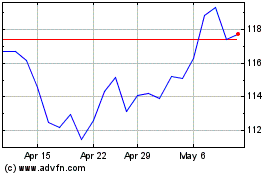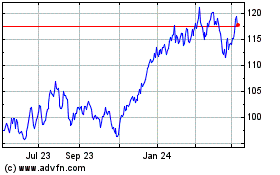Pound Falls Further as 'Brexit' Shock Lingers
27 June 2016 - 5:50PM
Dow Jones News
Pressure on the British pound intensified on Monday amid a
volatile trading session for currencies in Asia, after the U.K.
voted to leave the European Union on Friday and its currency closed
at its lowest levels in more than 30 years.
In morning trading in Asia, the British pound fell a further
2.1% to 1.3401 against the U.S. dollar. The euro also dropped 1% to
1.1011 against the U.S. dollar.
"Both pairs have been under pressure since the open today on the
back of continuing general uncertainty for the euro and the U.K.
downgrade announced late Friday night," said Simon Winn, Hong
Kong-based head of sales for Asia Pacific at EBS, the electronic
currency-trading arm of inter-broker dealer ICAP. On Friday,
Moody's Investors Service lowered its ratings outlook on the U.K.
to "negative" from "stable."
"Volumes are significantly above usual expectations across the
board," he said, with demand seen for safe-haven currencies like
the Japanese yen.
Currencies in Asia also experienced volatility. The Japanese yen
strengthened 0.3% to 101.907 against the U.S. dollar, while the
Korean won weakened 1.1% to 1,183.4 against the U.S. dollar.
The Chinese yuan fell to its weakest level against the U.S.
dollar since late 2010, after the biggest one-day depreciation of
the currency's daily fixing since last year's shock devaluation in
August. The onshore yuan last traded 0.4% weaker at 6.6388 against
the U.S. dollar.
British Chancellor of the Exchequer George Osborne is due to
deliver a statement to reassure investors before markets in London
open later in the day.
The lack of clarity from the U.K. after the vote undermined
market confidence, said Tim Kelleher, head of institutional
foreign-exchange sales at ASB Bank in New Zealand, a unit of
Commonwealth Bank of Australia.
"The market is still taking a negative view on everything," he
said. "People have had time to think about it, and it's raised more
questions than answers."
The U.K. is facing a vacuum at the top levels of its leadership,
with the ruling Conservative Party currently debating who will
succeed David Cameron as prime minister following his resignationÂ
Friday.
The opposition Labour Party, meanwhile, was facing its own
leadership challenge after 11 members of leader Jeremy Corbyn's
shadow cabinet resigned.
Write to Gregor Stuart Hunter at gregor.hunter@wsj.com
(END) Dow Jones Newswires
June 27, 2016 03:35 ET (07:35 GMT)
Copyright (c) 2016 Dow Jones & Company, Inc.
Commonwealth Bank Of Aus... (ASX:CBA)
Historical Stock Chart
From Mar 2024 to Apr 2024

Commonwealth Bank Of Aus... (ASX:CBA)
Historical Stock Chart
From Apr 2023 to Apr 2024
